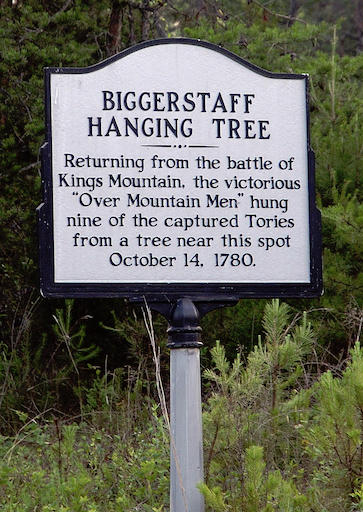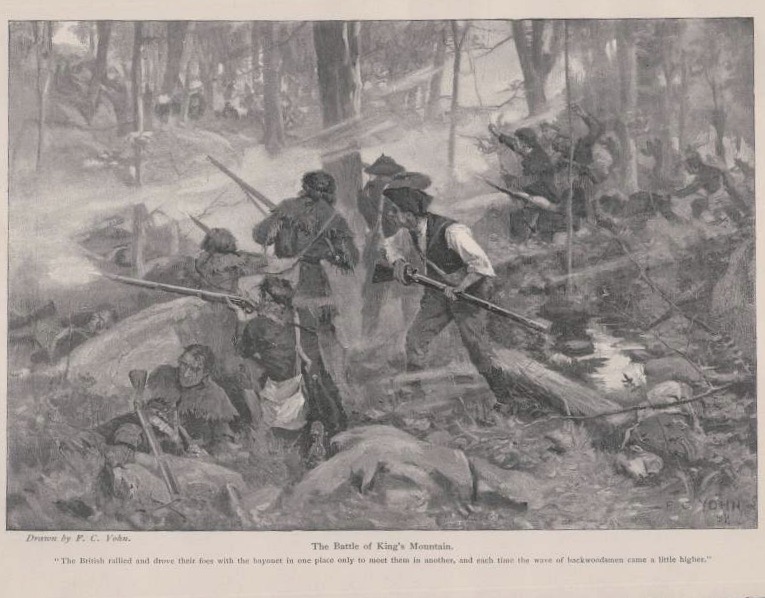Two-hundred and forty years ago today, Oct. 7, 1780, a group of backcountry militiamen won a decisive battle over the Tories (Loyalists) at the Battle of King’s Mountain. Cited by historians as a key turning point for the Americans in the Revolutionary War, the battle was a part of the southern campaign of the war taking place in South Carolina, about 10 miles south of the present-day town of King’s Mountain, NC. My Scots-Irish ancestor, Arthur McFalls, and his brother, John, were at the battle, as TORIES!!
I’ve written two previous blogs about Arthur because he is a fascinating ancestor and because I’ve been able to learn quite a bit about him from his Revolutionary War pension applications. Yes, you read that correctly. Arthur applied for and received a pension for his service in the American Revolution. The pension application mentions nothing about the Battle of King’s Mountain. Not surprising since he served on the wrong side of that battle.
Brotherly love?
While we have Arthur’s own testimony as relates to his Revolutionary War service, we have less information about he and his brother’s role in the fight at King’s Mountain. John was the elder brother, so we descendants like to believe that Arthur was likely influenced by his brother to serve with the Tories. John was a well-known Tory leader in what was then Burke County, NC.
Prior to the uprisings, colonial settlements had local militias made up of able-bodied men aged 16-60 who were required to bear arms to protect the colonists. Arthur and John often served as scouts or “Indian spies” when the local militias confronted the indigenous people who fought against the further encroachment of the colonists. When the conflict between the colonists and the British crown began, many of these militias divided with some remaining loyal and others rebelling. As the war progressed and both sides began to forcibly conscript soldiers, men might serve first on one side and then another in order to avoid punishment as well as conflict with family members or neighbors.
Briefly, the battle

The Overmountain Men, as the militiamen from the western part of the Carolinas and the present state of Tennessee were known, soundly defeated the Tory forces led by Major Patrick Ferguson, who incidentally was a Scottish soldier in the British army hailing from Aberdeenshire, Scotland. Launching a four-pronged attack with two columns on each side of the mountain, the Overmountain Men surprised Ferguson and his troops, who were mostly made up of local Loyalist militias, including apparently one with Arthur and John. Ferguson was killed during the battle; John and Arthur captured. Arthur was wounded in the arm, according to some sources.
After the battle
After burying the dead and organizing their prisoners — more than 650 captured — the Patriots began the long march back to North Carolina and their frontier homes. While camped at the home of Loyalist Aaron Biggerstaff (near present day Bostic, NC) on Oct. 13 and 14 awaiting orders of what to do with the prisoners, some of the Patriots complained about crimes committed against them and their families by the captured Loyalists. The officers in charge arranged a court martial and by the end of the day had convicted more than 30 men and sentenced them to be hanged, including John and Arthur.

One account of what happened to Arthur and John after the Battle of King’s Mountain comes from historian Lyman C. Draper in King’s Mountain and Its Heroes, published in 1881 and partially based on interviews with Revolutionary War veterans, their children and grandchildren.
Draper’s account:
“At the trial at Bickerstaff’s when [John] McFall’s case was reached, Major McDowell, as the proper representative of Burke County, whence the culprit hailed, was called on to give his testimony; when, not probably regarding McFall’s conduct as deserving of death, he was disposed to be lenient towards him. Colonel Cleveland, who, it would appear, was one of the presiding justices, had his attention attracted from his paper, upon which he was making some notes, by hearing McFall’s name mentioned, now spoke up– ‘That man, McFall, went to the house of Martin Davenport, one of my best soldiers, when he was away from home, fighting for his country, insulted his wife, and whipped his child; and no such man ought to be allowed to live.’ His fate was sealed by this revelation; but his brother, Arthur McFall, an old hunter of the mountains, was saved through the kind intervention of Major and Captain McDowell, believing, as he had been wounded in the arm at King’s Mountain, it would admonish him not to be found in the future of bad company.”
My lucky ancestor
Fortunately for me and Arthur’s many, many other descendants, our ancestor was not hanged after the Battle of King’s Mountain. Plus, he heeded the advice to not be found in the “bad company” of Loyalists following the Battle of King’s Mountain. According to his pension application his next military service began in early 1781 when he was stationed at Wofford’s Fort in Turkey Cove in Burke County as an “Indian spy.”
Learning about and embracing our ancestors is enlightening but also sometimes disappointing. We all want ancestors who were heroic and never morally compromised! The truth for most Scottish Americans and Scots-Irish is that some of our ancestors were colonizers and enslavers, but they were also self reliant, ingenious and tenacious, which is why we exist today. So tonight I will raise a wee dram and say “Slàinte mhath” to honor my lucky ancestor Arthur McFalls, who didn’t get hanged after the Battle of King’s Mountain!



3 Comments
I too had relatives that fought at the Battle of Kings Mountain. Col. Fredrick Hambright. He was German and came to America. He was Col. over the Lincoln County Milita. H elost a leg during the battle and lived to be an old man. My DNA shows I’m half Scottish with thre rest showing Welsh, Danish and Norweign. I do not have very much information on my fathers side but his father could have had the surname of Cunningham as his name was changed by his mother due to her hating the government. She was Creek nation.
Hi there! It appears Arthur is my grandfather x6! I would be interested to learn more about him as the story goes his parents were killed by Native Americans and he and John grew up on Native land. His first wife was Native American as well. And to learn my ancestors are directly involved in the genocide of Indigenous people is heartbreaking, though albeit not surprising. Please contact me cousin!
Your Arthur is in the DAR patriot database, so the Daughters consider that his last known actions were patriotic. I can’t imagine having to choose sides against relatives, friends, and neighbors. It wasn’t an easy time for anyone. (Most of my ancestors were still in Scotland, but I have a few Patriots that ascend from my one American great-grandmother.)